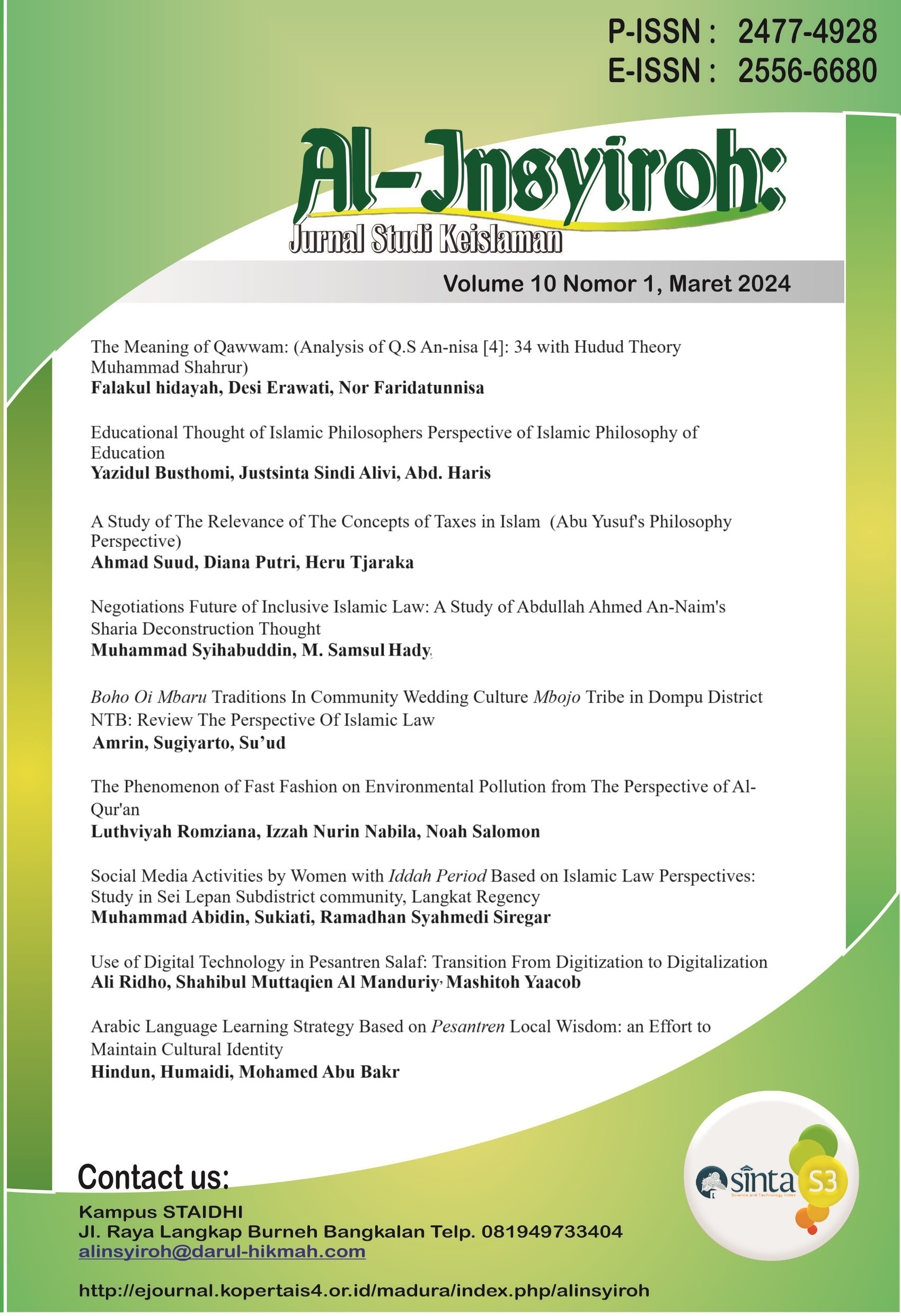Use of Digital Technology in Pesantren Salaf: Transition From Digitization to Digitalization
DOI:
https://doi.org/10.35309/alinsyiroh.v10i1.7291Keywords:
Pesantren salaf, transition, digitalizationAbstract
Pesantrens Salaf is an Islamic educational institution that firmly upholds the values of purity and originality of Islamic religious teachings, is faced with the challenge of following the rapid flow of digitalization. Pesantren are institutions that have existed in Indonesia for hundreds of years.Pesantrens Salaf is famous for its educational model which still uses many traditional or analog methods in implementing the transition from digitization to digitization which is very importantt in order to keep up with developments in today's increasingly advanced. This research aims to reveal the use of digital technology in Pesantren salafs. Even though it is paradoxical, the fact is that the development of digital technology in Pesantren salafs is very rapid. This research uses a qualitative method with a case study approach, namely at the pondok pesantren Mambaul Ulum Bata Bata, was obtained through interviews, observation and documentation, to ensure the validity of the data, continuous studies and consultation with experts were carried out. The results of this research found the fact that Pesantren salafs not only use digital technology as a basis for educational services including learning and administration processes, but there is also a connection between one component and another, so it can be said that there is a transition from digitization to digitization.References
Al Hana, Rudy. “Eksistensi Pesantren Salafiyah: Perubahan Dan Kesinambungan Di Pondok Pesantren Langitan Tuban.” Phd, UIN Sunan Ampel Surabaya, 2017. http://digilib.uinsa.ac.id/41876/.
Bloomberg, J. (2018). Digitization, digitalization, and digital transformation: confuse them at your peril. Forbes. Retrieved on August, 28, 2019
Habibah, Astrid Faidlatul, and Irwansyah Irwansyah. “Era Masyarakat Informasi Sebagai Dampak Media Baru.” Jurnal Teknologi Dan Sistem Informasi Bisnis 3, no. 2 (July 11, 2021): 350–63. https://doi.org/10.47233/jteksis.v3i2.255.
Haryono, Eko. “Metodologi Penelitian Kualitatif Di Perguruan Tinggi Keagamaan Islam.” An-Nuur 13, no. 2 (October 31, 2023). https://doi.org/10.58403/annuur.v13i2.301.
Hasyim, Muhammad. Penggunaan Teknologi Informasi di Pesantren. Academia Publication, 2023.
Kurniawan, Nanda Alfan, and Priska Christi Wardhani. “Tren Digitalisasi Pendidikan Di Indonesia Pasca Pandemi Covid-19.” Seminar Nasional Peta Jalan Pendidikan dan Rancangan Undang-Undang Sistem Pendidikan Nasional 1, no. 1 (September 29, 2021). http://conference.um.ac.id/index.php/snpjp/article/view/1822.
Maksum, Ali, and Happy Fitria. “Tranformasi Dan Digitalisasi Pendidikan Dimasa Pandemi.” PROSIDING SEMINAR NASIONAL PROGRAM PASCASARJANA UNIVERSITAS PGRI PALEMBANG, April 21, 2021. https://jurnal.univpgri-palembang.ac.id/index.php/Prosidingpps/article/view/5498.
Marzuki, Usman, and Muhammad Amin. “Modernisasi Sistem Pendidikan Pesantren.” Jurnal Al-Kifayah: Ilmu Tarbiyah Dan Keguruan 1, no. 2 (December 31, 2022): 72–79.
M.Pd, Prof Dr H. E. Mulyasa. Implementasi Kurikulum Merdeka. Bumi Aksara, 2023.
Mufaizin, M. (2020). Genealogi Radikalisme Islam Klasik dan Kontemporer. Al-Insyiroh: Jurnal Studi Keislaman, 6(1), 115-126.
Pahleviannur, Muhammad Rizal, Anita De Grave, Dani Nur Saputra, Dedi Mardianto, Lis Hafrida, Vidriana Oktoviana Bano, Eko Edy Susanto, et al. Metodologi Penelitian Kualitatif. Pradina Pustaka, 2022.
Puspitadewi, Ira. “Pengaruh Digitalisasi Perbankan Terhadap Efektivitas Dan Produktivitas Kerja Pegawai.” JURNAL MANAJEMEN DAN BISNIS INDONESIA 5, no. 2 (December 27, 2019): 247–58. https://doi.org/10.32528/jmbi.v5i2.2925.
Putra, M. K. B. (2015). Eksistensi Sistem Pesantren Salafiyah dalam Menghadapi Era Modern. Al-Insyiroh: Jurnal Studi Keislaman, 1(1), 87-104.
Ramdhan, T. W. (2019). Model Pengembangan Kurikulum Multikultural. Jurnal Al-Insyiroh: Jurnal Studi Keislaman, 5(2).
Ridho, Ahmad, Kautsar Eka Wardhana, Ayu Sasadila Yuliana, Ikhwan Nuur Qolby, and Zalwana Zalwana. “Implementasi Pendidikan Multikutural Berbasis Teknologi Dalam Menghadapi Era Society 5.0.” EDUCASIA: Jurnal Pendidikan, Pengajaran, Dan Pembelajaran 7, no. 3 (December 31, 2022): 195–213. https://doi.org/10.21462/educasia.v7i3.131.
Royyana, Aang. “Strategi transformasi digital pada pt. Kimia farma (persero) tbk.” Journal of Information Systems for Public Health 5, no. 2 (October 21, 2021): 15–32. https://doi.org/10.22146/jisph.34179.
Setyawan, Deny, and Sishadiyati Sishadiyati. “Transformasi Digital Sebagai Tantangan Dan Peluang Dalam Menciptakan Bisnis Startup Yang Inovatif.” Jurnal Ilmiah Wahana Pendidikan 9, no. 21 (November 6, 2023): 191–96. https://doi.org/10.5281/zenodo.10074951.
Siregar, Yakin Bakhtiar. “DIGITALISASI ARSIP UNTUK EFISIENSI PENYIMPANAN DAN AKSESIBILITAS.” Jurnal Administrasi dan Kesekretarisan 4, no. 1 (May 20, 2019): 1–19. https://doi.org/10.36914/jak.v4i1.192.
Sulianta, Feri. Literasi Digital, Riset dan Perkembangannya dalam Perspektif Social Studies. Feri Sulianta, 2020.
Syahrizal, Irvan, Asep Supriatna, Arico Ayani Suparto, Andy Rachman, Imam Mashudi, Febri Arissandi, Rifka Agustianti, et al. Teknologi Pendidikan. Get Press, 2022.
Downloads
Published
How to Cite
Issue
Section
License
Copyright (c) 2024 Al-Insyiroh: Jurnal Studi Keislaman

This work is licensed under a Creative Commons Attribution-ShareAlike 4.0 International License.

This work is licensed under a Creative Commons Attribution-ShareAlike 4.0 International License.












